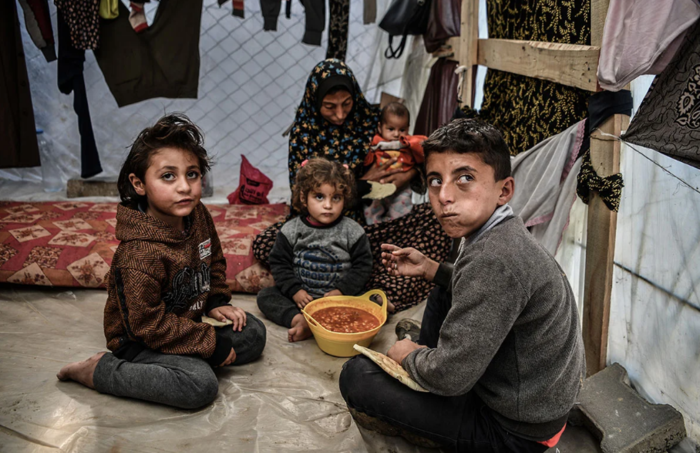A new report by the Integrated Food Security Phase Classification (IPC) says the risk of famine will remain high across the Gaza Strip as long as the conflict continues and humanitarian access remains restricted.
Food insecurity affects women in Gaza in multiple ways. UN Women estimates that at least 557,000 women in Gaza are severely food insecure, facing old and new gender-based vulnerabilities.
This situation is of particular concern for mothers and adult women, who often prioritize feeding others over themselves, report greater food accessibility than men, and are more likely to skip meals or reduce their intake in order to feed their children. During conflict, women's care burdens increase, their access to services is restricted, their health and food security is threatened, and they are at increased risk of experiencing all types of gender-based violence.
Below are five key facts that explain how food insecurity is affecting women in Gaza, based on a recent UN Women survey of people across the Gaza Strip:1
Caregiving Burden: Women, especially in tents and overcrowded homes, have increased caregiving and household responsibilities and struggle to look after their children's physical and mental health. 77% of survey respondents, both male and female, said that caring for their children, including food and personal care, is primarily the mother's responsibility. Physical Health and Weight Loss: Food insecurity and malnutrition are widespread in Gaza. Seven in 10 women interviewed by UN Women said they had lost weight in the past 30 days, and more than half experienced frequent dizziness. Food Assistance: More than 80% of female respondents rely on food assistance as their main source of food, but 87.3% believe that food assistance is not distributed fairly according to family size. Previous evidence collected by UN Women suggests that mothers often skip meals to feed their children, rarely eating last. In addition, 83.5% said that assistance does not meet their household needs. Pregnancy, Childbirth, and Postpartum Complications: Pregnant and breastfeeding women face increased health risks due to inadequate healthcare and nutrition. 76% of pregnant women report anemia and 99% have challenges obtaining necessary nutritional products and supplements, putting maternal and child health at risk. Among households with lactating mothers, 55% report health conditions that prevent them from breastfeeding and 99% have challenges ensuring sufficient breast milk, compromising infant survival, growth and development. Kitchen access and unsafe cooking methods: Only one-third of respondents reported having access to a kitchen where they could cook meals. Additionally, 69% resort to unsafe cooking methods, such as using wood and other waste materials, which increases health risks. Women, who are traditionally responsible for food preparation, are exposed to harmful smoke and pollutants, leading to respiratory and other health problems.
“When we were living in Gaza City, suddenly there was no food because of the war,” said a 16-year-old girl interviewed in a UN Women study. “There were no vegetables in the market, no food at all. We had to eat the worst possible food.”
“For example, we didn't have white flour, so we had to mix it into the animal feed,” she said. “It was the first time we had eaten animal feed, so our stomachs hurt. Everyone had stomach aches. Some days we had no food at all, and we were exhausted. There were also no hospitals, and some days we couldn't leave our houses because of the bombings.”
Recommended Actions
Allow humanitarian access: Ensure unhindered access for all residents throughout the Gaza Strip. Provide life-saving humanitarian assistance: Address the extremely severe and acute acute food insecurity and alarming water and sanitation conditions by restoring health, nutrition, water and sanitation services, and providing safe, nutritious and sufficient humanitarian food assistance to all people in need. All aid supplies, including medicines, fuel and other essentials, should be allowed to enter and move into the Gaza Strip. Provide malnutrition prevention and treatment services: Provide acute malnutrition treatment services while maintaining and protecting stabilization centers and outpatient care. Promote and support breastfeeding, and provide ready-to-use infant formula for infants who are not breastfed. Provide complementary foods and micronutrient supplements for young children, pregnant and lactating women, chronically ill people and the elderly. Restore production and market systems: Restore the functioning of market infrastructure and bakeries, with cash interventions where possible. Reconstruct food production systems, including horticulture, livestock and fisheries, as soon as possible. Commercial deliveries should continue, but not at the expense of humanitarian assistance.
1. A UN Women survey of 295 men and 305 women across the Gaza Strip in April 2024



